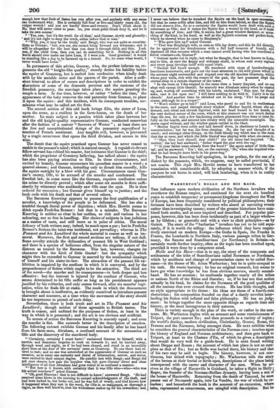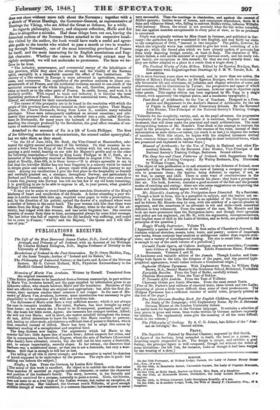WARBURTON'S ROLLO AND HIS RACE.
THE influence upon modern civilization of the Northern invaders who overthrew the Roman empire, and continued for the next six hundred years to establish temporary or permanent kingdoms throughout the West of Europe, has been frequently considered by political philosophers; their fortunes have been described by writers who aimed at narrating events rather than investigating causes; some of the greater historians have com- bined both modes, and at once inquired and described. For popular pur- poses, however, this has been done incidentally as part of a larger whole--• as by Gibbon ; or generally and with a view to elicit principles—as by Guizot. The story of the " barbarian " invaders has yet to be told sepa- rately, if it is worth the telling : the influence which they have respec- tively exercised on modern Europe—the Goths in Spain, the Franks in France, the Lombards in Northern Italy, various passage tribes in Ger- many, the Saxons and Scandinavians (or Northmen) in Britain—is certainly worth further inquiry, often as the topic has been touched upon, provided it were done by a competent mind. Rollo and his Race—that is to say, the story of the conquests and settlements of the tribe of Scandinavians called Norsemen or Northmen, which by accidents and change of pronunciation came to be called Nor- mans—is the theme of Mr. Acton Warburton ; but he is quite unequal to his task. He wants learning : he has no original research, but seems to have got what knowledge he has from obvious sources, mostly second- hand. He has no acumen : he confounds together nearly all the tribes or nations North of the Rhine and Danube; or, if he has not that notion actually in his head, he claims for the Normans all the good qualities of all the nations that ever crossed these rivers. He has little thought, and no style appropriate to his theme : his ideas are those of a fourth-rate rhetorician ; his composition founded on that of a dandy novelist inter- larding his fiction with inflated and false philosophy. He has no judg- ment: he brings together the most opposite things as regards time and history, or the most incongruous in their natures.
There is variety enough in the plan of the work, or rather in the con- tents. Mr. Warburton begins with an account and some reminiscences of Treport, the port nearest Ea ; and then proceeds to a variety of topics ; the world's destiny, modern civilization, Christianity, Greece, Rome, the Teutons and the Normans, being amongst them. He next exhibits what he considers the general characteristics of the Norman race ; touches upon the history of England and Norman architecture; and then gets back to Treport, at least to the Chateau d'Eu, of which he gives a description that would do very well for a guide-book. He is next found writing about Dieppe and Rouen ; the account of which last place is not so com- plete as that of Eu ; but as Rollo was buried there, his history and that of his race may be said to begin. The history, however, is not con- tinuous, but mixed with topography; Mr. Warburton tells the story of the heroes at their burial or birth-spot, descriptions of the place being interspersed with the career and character of the men. When he ar- rives at the village of Hauteville le Gnichard, he takes a flight to Sicily; Roger, the founder of the Norman-Sicilian dynasty, having been a son of the house of Hauteville. Returning from the death of Tancred, he soon passes out of Normandy again, into La Vendee, the war of which he re- hashes ; and henceforth the book is the account of an excursion, where tales, represented as occurrences, are mingled with description. But he does not close without more talk about the Normans ; together with a a sketch of Warren Hastings, the Governor-General, as representative of Hastings the Viking, who set Alfred the Great at defiance, for a while.
As regards philosophy, history, and eloquent reflection, Rollo and his Race is altogether a mistake. Had these things been cut out, leaving the historical notices of the Norman Dukes attached to the respective locali- ties visited by the author, the book would have made a useful and agree- able guide to the tourist who wished to pass a month or two in wander- ing through Normandy, one of the most interesting provinces of France for itself, and the most interesting for its English associations and Eng- lish character. Whether the causes in the following extract may be rightly assigned, we will not undertake to pronounce. The facts we be- lieve to be true.
" The industry, perseverance, and commercial energy of the inhabitants of this province, while they show the strength and the vitality of the Norman spirit, exemplify in a remarkable manner the effect of free institutions. No country of a like extent in Europe is more advanced in agriculture, manufac- tures, and commerce. The superfieies of the province amounts to about one- seventeenth of all France, and the territorial revenues amount to one-ninth of the territorial revenues of the whole kingdom; the soil, therefore, produces nearly twice as much as in the other parts of France. In cattle, horses, and wool, it is similarly prolific. With regard to trade and industry, it is likewise the most flourishing portion of France. Havre is its first commercial town; Bonen, Bolbec, Elbreaf, are celebrated for their manufactures.
" The causes of this prosperity are to be found in the resolution with which the e of this province have always insisted on their ancient rights. Their Magna the Cherie Normande, wrung from Louis X., contains many valuable privileges. These were subsequently confirmed on several occasions; and ulti- mately they procured their customs to be collected into a code, called the Con- tame de Normandie, for many years the bulwark of their liberties. Notwith- standing the changes produced by the Revolution, the good effect remains of cen- turies of unfettered industry."
Attached to the account of Eu is a life of Louis Philippe. The first of the following anecdotes is characteristic, the second rather apocryphal; but we take them as they stand. " On the 2d of Jane 1844, Mr. Burk, the Vice-Consul at Hammerfest, cele- brated the eighty-second anniversary of his birthday. On that occasion he re- ceived a letter from the King of the French, written with his own hand, accom- panying a gold medal, bearing on one side his Mty's profile and on the other
the following inscription--' Given by King Louis PhilippeF' to M. C. Bark, as a memorial of the hospitality received at Hammerfest in August 1795. The letter, dated at Neuilly, June 6th, is in these terms—' It is always agreeable to me to find that the traveller Miller has not been forgotten in a country which he visited in simple guise and unknown: I always recall with pleasure this journey to my mind. Among my recollections I give the first place to the hospitality so frankly and cordially, granted me, a stranger, throughout Norway, and particularly in Norland and Finmark; and at this moment, when a lapse of forty-nine years since I made this ,journey into Norway has left me but few of my old hosts remaining, it is gratifying to me to be able to express to all, in your person, what grateful feelings I still entertain.'
" It may not be amiss to record here another anecdote illustrative of the King's kindness of heart and recollection of old friends. A doctor attending a poor wo- man in London some little time ago, required some paper to write a prescription, and, by the direction of his patient, opened the drawer of a cupboard where were a number of letters in the same hand. The ...r woman told hun that these were letters from the King of the French. His jesty, when in the days of his ad- versity, had lodged with this woman, and has never forgotten her. She receives presents of money from time to time, accompanied always by some kind message. The last letter was full of regrets that his old landlady was suffering, and urged her to come to France; where,' said his Majesty, the Queen and I will take care of you.'"



























 Previous page
Previous page